Words of Wisdom - Shastra
& Shastrakaras speak
For Books and shastra downloads see Main Index, under
Books:
Om Namo Bhagavate Vasudevaya
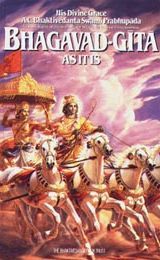
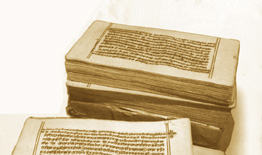
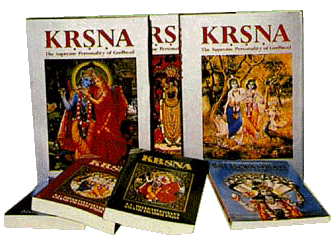
The Complete Works of Srila Prabhupada
All the books, the letters and conversations at your
fingertips
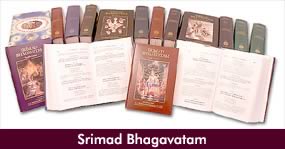
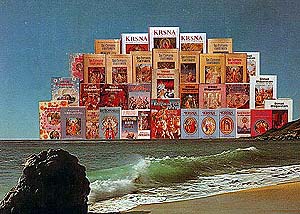
All Srila Prabhupada's books and more on one disk
http://www.vedabase.com




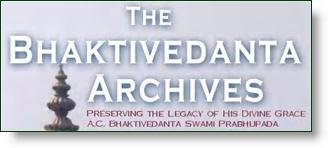
Srila Prabhupada's Audio lectures to listen to on-line:
http://www.hare-krishna.org/srila-prabhupada-lectures.htm
Listen to Srila A.C. Bhaktivedanta Swami Prabhupada on-line
- all 900 of his lectures are available HERE:
http://www.prabhupadavani.org/
Srimad Bhagavatam - the entire lecture series listen and
read along on-line - Narrated by Amala Bhakta dasa:
http://www.prabhupadavani.org/SB_index.html
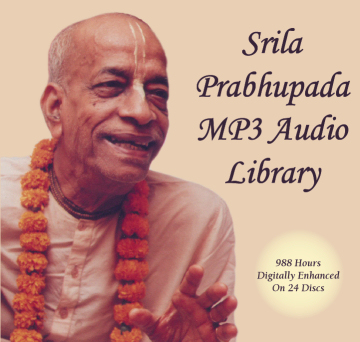
The new enhanced Prabhupada MP3 series
http://www.prabhupada.com/store/store.php?page=product.php&id=MP3AUDIOLIB








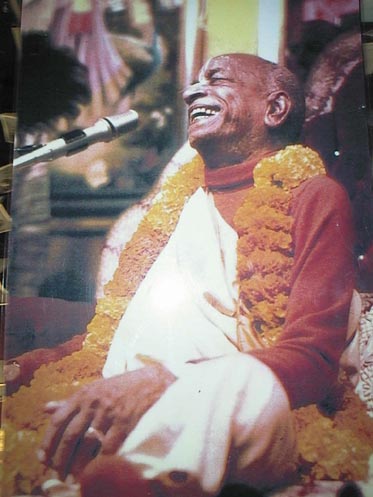
Visit "Prabhupada Connect" for all manner of Prabhupad
Nectar:
http://www.prabhupadaconnect.com/Index.html
Srila Prabhupada's Final Lesson Video - Downloadable and
viewing on-line
http://users.iskconludhiana.com/images/thumbnails.php?album=21


All Srila Prabhupada's original books
available for sale here.

Download all the Hare Krsna teachings which includes
all Vaisnava and
Vedic concepts by visiting one of the sites listed at
the following address.
http://www.geocities.com/suci123/bookdownloadsites1.html
The Bhaktivedanta Book Trust
Srila Prabhupad Memorial Library
http://www.krishna.com/main.php?id=33


33 Books Online Including Srimad Bhagavatam!
http://www.geocities.com/freeprabhupadabooks
The compressed "self extracting" file mentioned is now currently
available for download
http://www.krsnaconsciousness.org/Gauranga/Folio/BhaktivedantaVedabase_DOS.exe

Download or Listen to Prabhupad Bhajans HERE:
http://www.prabhupadavani.org/web/text/Bhajans.html


On-line 1972 McMillan edition - Bhagavad Gita As It Is:
http://www.asitis.com/

Bhagavad Gita AS IT IS on-line through the Tirupathi
Balaji site:
http://www.bhagavad-gita.us/

Bhagavad Gita Study guide on-line book:
http://chantandbehappy.com/gita/studyguide/StudyGuide-main.htm
Bhagavad Gita Study guides by numerous Iskcon devotees
- FREE downloads:
http://www.veda.harekrsna.cz/library/#3

All the Scriptures you'd ever need 4 FREE
http://www.hknet.org.nz/index-books.htm
http://www.hknet.org.nz/DDB.htm
http://www.hknet.org.nz/DDB2.html
last updated 4th August 2003


Srimad Bhagavad Gita AS
IT IS
Bhagavad Gita: Chapter
6 - Dhyana-yoga
TEXT 31
sarva-bhuta-sthitam yo mam
bhajaty ekatvam asthitah
sarvatha vartamano 'pi
sa yogi mayi vartate
WORD FOR WORD
sarva-bhuta-sthitam--situated in everyone's heart; yah--he
who; mam--Me; bhajati--serves in devotional service; ekatvam--in oneness;
asthitah--situated; sarvatha--in all respects; vartamanah--being situated;
api--in spite of; sah--he; yogi--the transcendentalist; mayi--in Me; vartate--remains.
TRANSLATION
Such a yogi, who engages in the worshipful service of
the Supersoul, knowing that I and the Supersoul are one, remains always
in Me in all circumstances.
PURPORT
A yogi who is practicing meditation on the Supersoul sees
within himself the plenary portion of Krsna as Visnu--with four hands,
holding conchshell, wheel, club and lotus flower. The yogi should know
that Visnu is not different from Krsna. Krsna in this form of Supersoul
is situated in everyone's heart. Furthermore, there is no difference between
the innumerable Supersouls present in the innumerable hearts of living
entities. Nor is there a difference between a Krsna conscious person always
engaged in the transcendental loving service of Krsna and a perfect yogi
engaged in meditation on the Supersoul. The yogi in Krsna consciousness--even
though he may be engaged in various activities while in material existence--remains
always situated in Krsna. This is confirmed in the Bhakti-rasamrta-sindhu
(1.2.187) of Srila Rupa Gosvami: nikhilasv apy avasthasu jivan-muktah sa
ucyate. A devotee of the Lord, always acting in Krsna consciousness, is
automatically liberated. In the Narada-pancaratra this is confirmed in
this way:
dik-kalady-anavacchinne
krsne ceto vidhaya ca
tan-mayo bhavati ksipram
jivo brahmani yojayet
"By concentrating one's attention on the transcendental
form of Krsna, who is all-pervading and beyond time and space, one becomes
absorbed in thinking of Krsna and then attains the happy state of transcendental
association with Him."
Krsna consciousness is the highest stage of trance in yoga
practice. This very understanding that Krsna is present as Paramatma in
everyone's heart makes the yogi faultless. The Vedas (Gopala-tapani Upanisad
1.21) confirm this inconceivable potency of the Lord as follows: eko 'pisan
bahudhayo 'vabhati. "Although the Lord is one, He is present in innumerable
hearts as many." Similarly, in the smrti-sastra it is said:
eka eva paro visnuh
sarva-vyapi na samsayah
aisvaryad rupam ekam ca
surya-vat bahudheyate
"Visnu is one, and yet He is certainly all-pervading. By
His inconceivable potency, in spite of His one form, He is present everywhere,
as the sun appears in many places at once."
His Divine Grace A.C. Bhaktivedanta Swami Prabhupada
Copyright 1983 The Bhaktivedanta Book Trust International. Used with
permission.

Bhagavad Gita As It Is - http://www.asitis.com/
Bhaktivedanta Vedabase - Bhagavad Gita on-line http://bhagavadgitaasitis.com/
Bhaktivedanta VedaBase: Bhagavad-gita As It Is http://vedabase.net/bg/en
Bhagavad Gita Multi Media Web-version http://chantandbehappy.com/gita/
Listen to Bhagavad Gita on line - http://www.Gitamrta.org
View our Bhagavad Gita Overview:
http://www.hknet.org.nz/BG.html
Archive: http://www.cs.rice.edu/~vivek/btg/archive/
Home Page: http://www.cs.rice.edu/~vivek/btg/
Join Bhagavad Gita eGroups HERE
mailto:bhagavad_gita-owner@egroups.com


Prabhupada Uvacha:
(here's some nectar, sometimes it comes in the form of Srutakirti prabhu's
diary, other times from Govinda dasi's diary, Hari Sauri prabhu's Transcendental
Diary, Bhurijan prabhu's book, or sometimes from a letter, or other related
source, but still nectar...)
There is no question of culture
July 27th, 1976
Once more, Prabhupada spent a quiet day, avoiding
too much physical activity. He remained in his room during the Deity greeting,
guru-puja and class. But he allowed Jayatirtha and Bhagavan prabhus to
come in his room for a relaxed discussion while the devotees carried on
the program without him.
George Harrison's visit prompted some talk about
artists. Prabhupada explained that in India the artistic class are considered
sudras, not a very high-class profession. He said a hundred years ago Girish
Chandra Ghosh tried to introduce theatrical performances with both men
and women actors, in imitation of the Europeans. "So he wanted to invite
woman artist. Not a single woman joined. Who will go to public stage to
dance, respectable girl? They'll never. That is hundred years."
He recalled that even forty years ago he knew
a respectable family who rejected the notion of teaching their daughter
to dance and sing. "The girl was to be married, and it is the custom in
India, the bridegroom's party comes to see the girl, whether she is right.
Similarly, the girl's party goes to see the boy. So they came to see my
friend's daughter, and the daughter is very beautiful, rich man's daughter.
So one of the bridegroom's party questioned, 'You know how to dance?' That
was the question to the girl: 'You have learned something about dancing
and singing?'
"So she was my friend Mukunda Mati's daughter.
His elder brother was there. He became very angry, that 'This rascal is
asking our daughter whether she knows dancing and singing.' He took it
as insult, that 'Respectable family, daughter should learn how to dance,
how to sing?' So immediately he protested, 'No, no, no. She does not know
how to dance, how to sing. She's not meant for that purpose. We like, of
course, a young girl dancing and singing, but we cannot teach our family
members. We spend for that outside. You cannot expect our Mullik's family
daughter dancing and singing.' Actually dancing, singing? What is this
nonsense? For a respectable family? It is meant for the low-class professional.
Pay them, they will dance. Or go to some prostitute, she will dance.
"Among the theatrical, Girish Chandra Ghosh could
not get a single response from any respectable family. Then he had to seek
some young girl from the prostitute class. They became later on famous
artists, Kusumkari Dasi. Nowadays it has become a fashion that aristocratic
family should join this cinema and spoil their character."
Bhagavan said that the artistic class is very
influential these days.
Using George as an example, Prabhupada acknowledged
the fact, explaining, "Somehow or other get money, you become a big man.
There is no question of culture or anything. That is stated in the Bhagavata.
Money will be the criterion -- no family, culture, education. These things
will not be taken into account. If you have got money, then you are big
man. Nevermind what you are. Therefore people are after money. Who is going
to be brahmana? If you become a perfect brahmana, who will care for you?
Nobody is interested to become a brahmana. 'Why we shall become brahmana?
For starvation?' Nowadays the colleges they're not interested in art, philosophy,
English literature. They go for technical, how they will get more money."
Remembering Professor O'Connell in Toronto, he
said, "Some of the doctor, professor, they came to request us to give our
student; they are not getting student. And after few years they'll be all
dismissed, who will pay them? Hayagriva told me. He's not getting any job.
There is another, Dr. Henderson, he's also not getting any job. He's selling
insurance. And Bon Maharaja, his institute is suffering from the very beginning
till now, simply begging, begging and paying, paying the professor. No
student. First of all he started Vaisnava philosophy, so doctorate, Ph.D.
So especially in India, who is going to take Ph.D. in Vaisnava philosophy
and starve? So this is failure. It is already failure, but he is persistent."
- From the "A Transcendental Diary Vol 3" by HG
Hari Sauri dasa
To receive little snippets of nectar like this on a daily basis subscribe
HERE: or If you want to introduce anyone else in reading Srila Prabhupada
Nectars, please send their eMail addresses to mailto:krpamaya_gauranga@hotmail.com
Please Chant:
 Hare
Krishna Hare Krishna Krishna Krishna Hare Hare
Hare
Krishna Hare Krishna Krishna Krishna Hare Hare
 Hare
Rama Hare Rama Rama Rama Hare Hare
Hare
Rama Hare Rama Rama Rama Hare Hare
...................and be Happy

Listen to Srila Prabhupad on-line
....a different lecture, morning walk, conversation or
class daily.
"God Has No Body Like Ours"
Srimad-Bhagavatam 1.3.1-3
March 28, 1968, San Francisco
Listen to the entire lecture on-line:
http://prabhupadaradio.com/M3U/Bhagavatam/m3u_II/SB065.m3u
Prabhupada: You read from the third chapter. [break]
Upendra: ...concerning "Description of Incarnations of
Godhead." Translation: "Suta said, In the beginning of the creation the
Lord first of all expanded Himself in the universal form of purusa incarnation
primarily with all the ingredients of material creation. And thus at first
there was the creation of the sixteen principles of material action. This
was on the intention of creating the material universe." Purport. "As it
is said in the Bhagavad-gita that the Personality of Godhead Sri Krsna
maintains this material universes by extending His part of plenary expansions,
so this purusa Form is the confirmation of the same principle. The Original
Personality of Godhead Vasudeva or Lord Krsna who is famous as the son
of King Vasudeva or King Nanda, the very same Personality of Godhead is
full with all opulences, all potencies, all fames, all beauties, all knowledge
and all renunciations. Part of His opulences is manifested as impersonal
Brahman and part of His opulences is manifested as Paramatma. This purusa
feature of the same Personality of Godhead Sri Krsna is the original Paramatma
manifestation of the Lord. There are three purusa features in the matter
of material creation and this form who is known as the Karanodakasayi Visnu
is the first of the three. The others are known as the Garbhodakasayi Visnu
and the Ksirodakasayi Visnu which we shall know one after another."
Prabhupada: These Visnu, Karanodakasayi, Garbhodakasayi,
and Ksirodakasayi, these are little technical. Try to understand. Now this
universe, which you find just like a big ball, there are innumerable universes
like this, and they are floating in water. That water is called Causal
Ocean. So that Causal Ocean there is, I mean to say, completely in the
whole ocean, big gigantic body is lying down there. That is known as Karanodakasayi
Visnu. The Visnu in that gigantic form is sleeping within the water of
that Causal Ocean, and by His inhaling and exhaling, breathing, there are
bubbles. And those bubbles are manifested as universes. This is stated
in Brahma-samhita: yasyaika-nisvasita-kalam athavalambya jivanti loma-vilaja
jagad-anda-nathah [Bs. 5.48]. That breathing, exhaling and inhaling...
Just like we also do that. So we have inherited that exhaling-inhaling,
from that Visnu.
So how these brahmandas or universes, each of them has
a predominate deity? He is called Brahma. Brahmanda, the master of this
brahmanda is called Brahma. The duration of this Brahma, duration of life,
is only the inhaling and exhaling period of Maha-Visnu. When He's exhaling,
all the brahmandas are coming in existence. And when He's inhaling, they're
all vanquished. This process is going on. And the Supreme Person who is
doing this, I mean to say, creation and dissolution, He is called Maha-Visnu.
Visnur mahan sa iha yasya kala-viseso govindam adi-purusam tam aham bhajami
**. So the reference is in the Brahma-samhita that that Maha-Visnu is also
part and parcel of Govinda, Krsna. Just try to understand what is Krsna.
Then? Go on.
Upendra: "The innumerable universes are generated from
skinholes of this Karanodakasayi Visnu, and in each one of the universes
the Lord enters as Garbhodakasayi Visnu."
Prabhupada: Again, after creation of the universes, He
enters each and every universe. This universe is filled with water, half.
What you are seeing, that is half only. And half is filled with water.
In that water Visnu again lying, expanding. This is Visnu's power. He can
expand in innumerable identities. That is also confirmed in the Brahma-samhita.
Advaitam acyutam anadim ananta-rupam [Bs 5.33]. Ananta means unlimited,
and rupa means forms. He's expanding in unlimited number of forms. We are
also expansion of His form. These jivas, the living entities... He is expanding
in two ways, svamsa and vibhinnamsa. Svamsa means Visnu. One extension,
expansion, is just directly He Himself. And another expansion is separated
from Him. That separated from Him we are.
We living entities, we are also vibhinnamsa. We are also
part and parcel, but we are separated. Therefore we haven't got the full
potency of God. We have got potencies of God. The six potencies, namely
opulence, fame, strength, beauty, knowledge and renunciation, we have also
got these in minute quantity. Whatever we see here, the richest man in
the world, that is only minute particle of the richness of God. Because
we are part and parcel, minute part and parcel. Therefore we have got all
the opulences in minute form. Just like gold and a minute particle of gold.
Chemically analyze the small particle of gold has got all the composition
as the original big gold. A drop of sea water... Chemically, a drop of
sea water has got all the composition as the big sea water. Similarly,
we have got all the qualities of God, but in minute quantity. That is the
difference between God and ourselves. Or in other words, you can study
God also by studying yourself. Whatever propensities you have got, that
is also there in God. Everything. Otherwise wherefrom it comes? Because
I am part and parcel, if I have got all these propensities, naturally,
in full and without any inebriety, those things are present in God.
Take for example our love, what you call love. Of course,
it is perverted reflection of love. Several times I've repeated. In this
material world there is nothing like love. It is only, everything perverted
reflection of love. Just like you have got affection for children. That
is there also, but that is without any inebrieties. Here also the same
man and woman, male and female, there is attraction between one another.
Similarly there is also, Radha-Krsna. But there is no inebriety. That is
full and that is perfect. Here it is imperfect due to material contamination.
So everything, whatever we have got, Krsna has also got
that thing. But in Krsna it is in perfection; in us, in our conditional
state of life, it is imperfect. So if we dovetail ourselves with Krsna,
then our..., all these propensities become perfect. The same example as
I have given repeatedly, that a car is running at seventy-mile speed, a
cyclist catches the car, he also runs in seventy-miles speed, although
the cycle hasn't got such speed. Similarly, although we are minute particle
of God, if we dovetail ourselves with the consciousness of God, or Krsna
consciousness, then we become equally spirit. This is the technique. Go
on.
Upendra: "In the Bhagavad-gita this is also mentioned
that the material world is created at certain intervals and then again
it is destroyed. This creation and destruction is done by the Supreme will
on account of the conditioned souls or the nitya-baddha living beings."
Prabhupada: Nitya-baddha. This word is also technical.
Nitya-baddha means ever-conditioned. There are nitya-muktas. Nitya-mukta
means ever-liberated. In the spiritual world, there are also innumerable
living entities. The... This material world is only one-fourth manifestation
of Krsna's energy, God's energy. And the three-fourths energy is manifested
in the spiritual world. So we can just imagine that in one-fourth manifestation
of energy of the Lord, we are so many living entities which is impossible
to count. Now you can imagine how many more living entities are there.
But here we are conditioned and they are liberated. Those who are conditioned,
they are called nitya-baddha, ever-conditioned. Nitya-baddha means we do
not know when our, this conditional stage has begun. It is impossible to
trace out the history. But we are conditioned. There is no doubt about
it. Conditioned means no freedom. No freedom. As spirit soul we are free.
Sarva-ga, we can go everywhere, anywhere. Even those who get some mystic
powers by perfection of yoga practice, they can also exhibit some powers.
So why? As we become free from material conditions, our original freedom
comes.
So one of the qualification of the spirit soul is sarva-ga.
Sarva-ga means he can go anywhere and everywhere. But because we are conditional
stage, we are trying so much to go to the moon planet, we cannot go. But
Narada, because he is free, he has got full spiritual body, he can go anywhere
he likes. Go on.
Upendra: "The nitya-baddha or the eternally conditioned
souls have the sense of individuality or ahankara which dictates them for
sense enjoyment which they are unable to have constitutionally. The Lord
is the only enjoyer and all others are enjoyed. The living beings are predominated
enjoyer. But the eternally conditioned souls forgetful of this constitutional
position have strong aspiration for enjoying. This chance of enjoying the
matter is given to the conditioned souls in the material world and side
by side they are given the chance of understanding the real constitutional
position. Those fortunate living entities who catch up the truth and surrender
unto the Lotus feet of Vasudeva after many many births in the material
world, become one of the eternally liberated souls and thus are allowed
to enter into the kingdom of Godhead. After..."
Prabhupada: We can also become one of them, eternally
liberated. But we are not admitted in the spiritual kingdom unless we have
given up this false sense of lording it over the material nature. Here,
the conditioned souls, everyone is trying to become the lord, imitating.
Everyone is trying. But there is clash. You are trying to become lord,
I am trying to become lord. Therefore there is clash. And in the spiritual
world the Lord is one and there is no competition of lording it over. Therefore
in the spiritual world everything is unconditioned, freedom. Yes, go on.
continued.......................
Listen to the entire lecture on-line:
http://prabhupadaradio.com/M3U/Bhagavatam/m3u_II/SB065.m3u
or receive in mailbox and Subscribe HERE:
mailto:lectures-subscribe@prabhupadavani.org
Sravanam kirtanam at:
http://www.PrabhupadaVani.org
© 2001 The Bhaktivedanta Book Trust International. Used with permission.

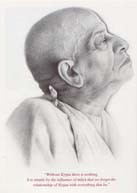
SRILA PRABHUPADA'S QUOTE OF THE DAY
So keep this standard as you are now keeping, then things will go automatically,
and one day people will understand in the history that this movement
was for saving the human society.
That day will come.
AR.DAL Lecture 1975
Sign-up to receive these quote HERE:
mailto:haribol@pacific.net.sg

Bhaktivedanta Vedabase Network ...
http://vedabase.net/


The Scientific - Mathematical
Proof for God's existence:
http://geocities.com/sector114
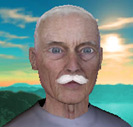
http://robot-hosting.com/php/login_nicholas.html
user name = guest
password = guest
(Collection of philosophical and mathematical proofs
for existence of God can be found in this site.)

Scientifically Philosophical Books for the layman
 ...
...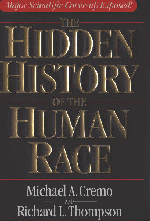 ...
...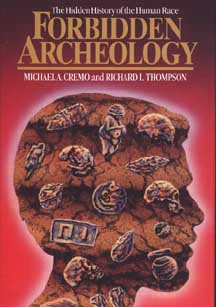 ...
...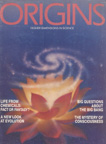
Click on any of these books to read more about them and where to get
a copy
or contact your local temple for purchases
sample of Life
comes from Life HERE.pdf

Lotus Imprints - Preserving Prabhupada's Legacy - The
Publishing House of Hari Sauri dasa
http://www.lotusimprints.com/

Quotes from Shastra - scriptures
View using Balaram font
"The Cäturmäsya period
begins in the month of Äñäòha (June-July) from
the day of Ekädaçé called Çayanä-ekädaçé,
in the fortnight of the waxing moon. The period ends in the month of Kärtika
(October-November) on the Ekädaçé day known as Utthänä-ekädaçé,
in the fortnight of the waxing moon. This four-month period is known as
Cäturmäsya. Some Vaiñëavas also observe it from the
full-moon day of Äñäòha until the full-moon day
of Kärtika. That is also a period of four months. This period, calculated
by the lunar months, is called Cäturmäsya, but others also observe
Cäturmäsya according to the solar month from Çrävaëa
to Kärtika. The whole period, either lunar or solar, takes place during
the rainy season. Cäturmäsya should be observed by all sections
of the population. It does not matter whether one is a gåhastha or
a sannyäsé. The observance is obligatory for all äçramas.
The real purpose behind the vow taken during these four months is to minimize
the quantity of sense gratification. This is not very difficult. In the
month of Çrävaëa one should not eat spinach, in the month
of Bhädra one should not eat yogurt, and in the month of Äçvina
one should not drink milk. One should not eat fish or other nonvegetarian
food during the month of Kärtika. A nonvegetarian diet means fish
and meat. Similarly, masüra dhal and urad dhal are also considered
nonvegetarian. These two dhals contain a great amount of protein, and food
rich in protein is considered nonvegetarian. On the whole, during the four-month
period of Cäturmäsya one should practice giving up all food intended
for sense enjoyment."
Sri Chaitanya Charitamritam Madhya
lila 4:169 purport.

The Chaturmasya Vrata from Haribhakti Vilasa
15th vilasa
Caturmasya Benefits
Bhavisya Purana- "One who passes the Chaturmasya
season without observing religious vows, austerities and chanting of japa,
such a fool although living should be considered to be a dead man."
Kanda Purana, Nagava Khunda- "In the month of shravana
(July, August) one should refrain from eating spinach. In the month
of Bhadra (August, September) of yogert in Ashvina (September, October)
milk. In Kartik (October, November) meat and urd dall.
Various vows and austerities during Chaturmasya and Their
respective results.
"O King, one who is My devotee and is fixed in vow, whether
man or woman, for the purpose of Dharma, should accept these various austerities
and observances. I shall now describe to you all of them along with their
respective results.
1) No salt—One's voice becomes sweet.
2) No oil—One's life is prolonged and gets progeny.
3) No oil massages—One's body becomes beautiful.
4) No cooking with oil—One's enemies are vanished.
5) No licorice and oil—One becomes wealthy.
6) Give up wearing unoffered flowers—One becomes a Vidyadhara
in Devapura.
7) Give up six kinds of tastes (spice, sour, bitter,
sweet, salty and harsh)—One never becomes ugly, smelly, or obtains a bad
birth.
8) Practice of yoga—One goes to Brahmaloka.
9) No betal nuts—One becomes happy.
10) No cooked food (raw fruits & Vegetables)—One
obtains purity.
11) No honey—One becomes lustrous.
12) No yogert or milk—One attains Goloka.
13) No cooking with earthen pots—One gets ... (?)
14) No hot food—One gets offspring with a long life.
15) Take rest on the ground or on stone—One becomes an
associate of Vishnu.
16) One who gives up meat & honey is a yogi and muni.
17) No intoxicating liquors—One becomes powerful and
free from disease.
18) Fast for one day—One is honored in Brahmaloka.
19) No cutting of hair and nails—One gets the benefit
of taking bath daily in Ganges.
20) No speaking of grama katha (nonsense)—One's order
will never be disobeyed.
21) Eat food on the ground without dish or plate—One
obtains a kingdom on Earth.
22) Chant the mantra Namo Narayana—One obtains the result
of giving in charity 100 times.
23) Offer prayers to the Lord—One gets the result of
giving cows in charity.
24) Touch the lotus feet of the Deity—One becomes a successful
person.
25) Clean the temple of the Lord—If one is king he remains
so for a Kalpa.
26) Circumambulating the temple three times offering
prayers—At the time of death one will mount a swan airplane and go to Vaikuntha.
27) Singing or playing musical instruments in the temple
of the Lord—One goes to Gardharvaloka.
28) Take pleasure in studying the sastras—One goes to
Vishnuloka.
29) Sprinkle water in the temple—One goes to apsaraloka.
30) Take bath in a holy place—One's body becomes pure.
31) Worship Lord Vishnu with flowers—One goes to Vaikuntha.
32) Eat panchagavya—One gets the result of observing
candrayana fasting.
33) Eat one meal a day—One gets the results of performing
an Agnihotra.
34) Eat at night only—One gets the result of going to
all the places of pilgrimage.
35) Eat at noon only—One attains Devaloka.
36) Take food not obtained by begging or any extraneous
endeavor—One gets the results of opening water stands and digging wells.
37) Take bath daily—One will never see hell.
38) No eating on a plate—One gets the result of bathing
at Pushkara
39) Eat on a leaf—One obtains the result of living at
Kurukshetra.
40) Eat on a stone—One obtains the result of bathing
at Prayog.
41) Giving up drinking to six hours—One will not be attacked
by diseases.
42) During the Chaturmasya, garlands, caranamrta, candana
and water from the conshell of the Lord, mahaprasädam, Deity garlands
must be accepted.
In this way one who performs this vrata for the satisfaction
of Lord Kesava becomes satisfied himself. O best of the Pandavas, among
My devotees, he who accepts these vows and austerities during the Chaturmasya
goes to my abode at the time of death, of this there is no doubt.
Vishnu Rahasya- Lord Brahma to Narada Muni.
If one accepts all these Vaisnava austerities and
observances with devotion, one attains the supreme destination O Narada.
One who desires within himself to execute all these Vaisnava austerities
and vows, his sins obtained within one hundred births is destroyed. If
one is exclusively devoted, peaceful, takes daily bath, is fixed in vow
and worships the Lord during these four months, he goes to the abode of
the Lord. He who accepts the austerity of sleeping on the ground this time
when the Vishnu Deity is sleeping in yoga nidra underwater, he goes to
the abode of Laxmi.
Read more about vrata, sankalpa and Chaturmasya in general
HERE
Chaturmasya-info-Madhwas.html
Chaturmasya-vrata.html

The vows of Chaturmasya and Kartika are not optional, but should be
observed by all, as noted in Hari-bhakti-vilasa (16.19):
niyamena vinA caiva yo nayet kArttikaM mune |
cAturmAsyaM tathA caiva brahma-hA sa kulAdhamaH ||
"He, who lives through the periods of Karttika and Chaturmasya without
vows is indeed the killer of a brahmin and the lowest of his dynasty."
Jiva Goswami quotes (BhS 270) on the best of austerities from the Caturmasya
Mahatmyam of Skanda Purana:
tathA caivottamaM loke tapaH zrI-hari-kIrtanam |
kalau yuge vizeSeNa viSNu-prItyai samAcaret ||
"Certainly in this world, the best of all austerities is Sri Hari-kirtana.
Especially in the age of Kali, it is to be done for the satisfaction of
Vishnu."
Many householders, busy as they are in their daily routines and work,
may not find the time for kirtan every day. In the four months of Chaturmasya,
one should, as the most important of all vows, endeavor to engage daily
in kirtan. If the Lord is not glorified and remembered, of what use are
the varieties of ritual observances, of which the primary intent is to
prepare the mind for those very activities?

All pictures from Srimad Bhagavatam and Iskcon works - Copyright ©2005
The Bhaktivedanta Book Trust
International, on the web at .http://www.krishna.com/.
Used with permission.









![]()
![]()
![]()

![]()
![]()
![]()
![]()

![]()
![]()
![]()
![]()















